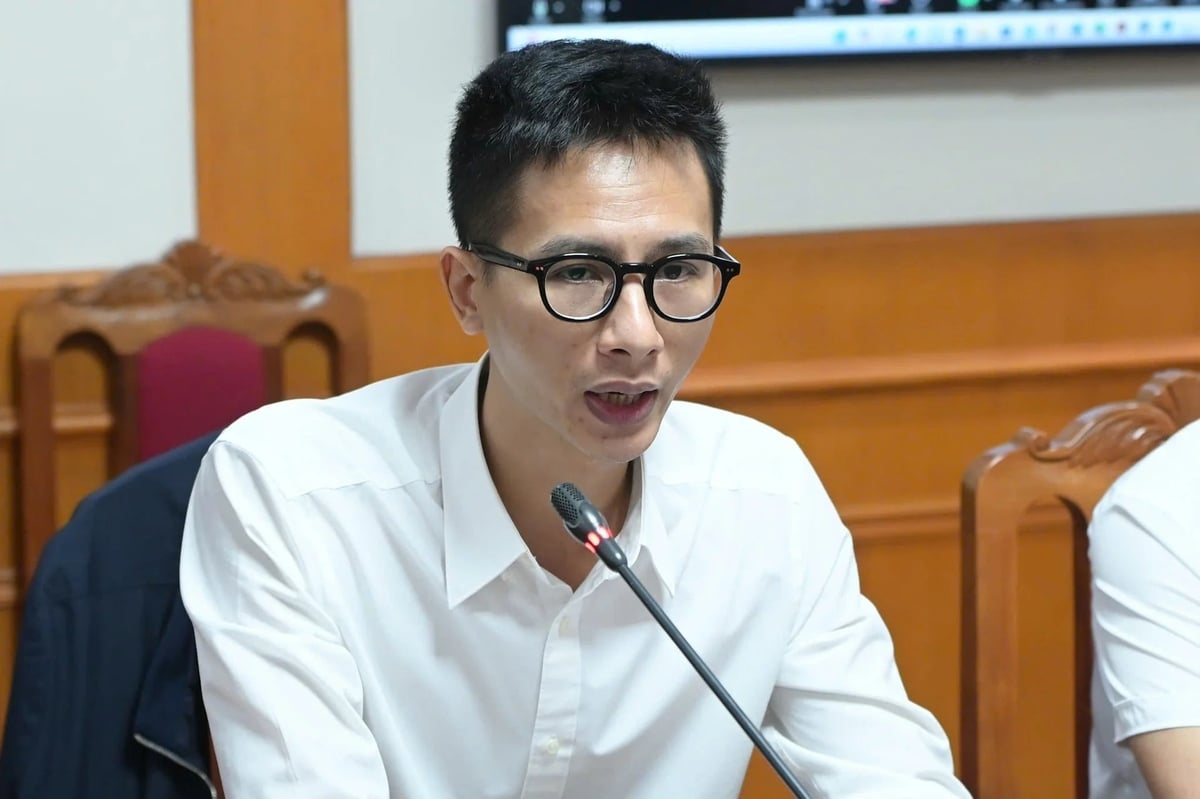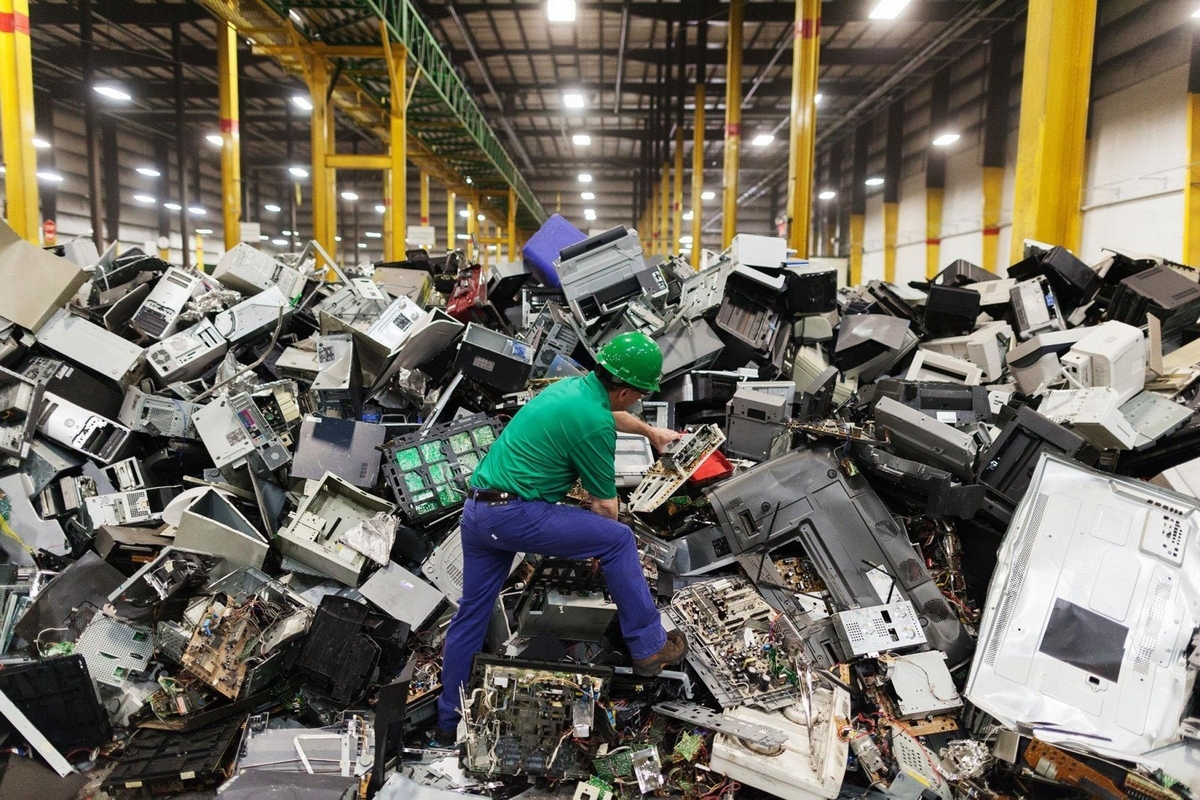November 28, 2025 | 01:54 GMT +7
November 28, 2025 | 01:54 GMT +7
Hotline: 0913.378.918
November 28, 2025 | 01:54 GMT +7
Hotline: 0913.378.918
According to Decree 05/2025 newly issued, producers and importers are responsible for collecting, recycling, or making financial contributions to treat waste from their products after consumption. This is the core content of the extended producer responsibility (EPR) mechanism that is being implemented.
Properly implementing the regulations not only helps businesses comply with the law but also opens the opportunity to reserve recycling results, exclude financial obligations, and approach many tax, land, and credit incentives.

Mr. Do Xuan Thuan, representative of the EPR Office, answered questions for businesses. Photo: Tung Dinh.
The representative of the EPR Office shared at the "Training Workshop on Implementing Extended Producer Responsibility (EPR) Regulations" that the recycling results exceeding the prescribed level in one year will be reserved for the following year if the business declares the plan and reports fully.
In addition, when the business implements recycling by hiring a recycling unit with enough legal conditions, the volume collected and handled in accordance with the regulations will be included in the EPR liability. In hiring a recycling unit, the business may recycle packaging of the same type; it is not required to recover the right type of packaging, as long as it meets the total volume as prescribed.
Products that are difficult to recover, such as refrigerators, phones, batteries, etc., also have flexible instructions. Businesses can recycle products of the same group instead of compulsorily recycling their designs, as long as they meet the prescribed rate. This is a way to adapt to the reality of a collection that is still limited.

By properly implementing the EPR regulations, businesses can reserve recycling volume and exclude financial obligations for next year.
In particular, the financial contributions to the responsibility of treating waste (such as shampoos and waste oil) in 2024 will be reserved for 2025 if not used. This helps businesses to be proactive financially and follow the appropriate progress.
However, some current difficulties are recorded from businesses, such as determining the type of packaging that must be declared and the volume of goods brought to the market and selecting the eligible recycling unit. Besides, the collection and recycling infrastructure is still in the process of completion. Many villages and small facilities do not have enough capacity and environmental conditions to participate in the EPR system in a formal way. Therefore, businesses need to proactively understand and cooperate with reputable recycling units having environmental licenses and technical capacity to ensure the results are recognized.
In parallel with the requirements, the state is also promoting preferential mechanisms. Recycling facilities can be exempted from taxes and receive land incentives, green credit, green bonds, etc. Additionally, the Ministry of Natural Resources and Environment has issued ecolabel criteria for packaging products, in which the packaging containing at least 20% recycled plastic will be granted the ecolabel. This is a basis for recycling facilities and businesses participating in EPR to enjoy more support.
Along with that, the policy of supporting the development of the circular economy is being boosted, encouraging cleaner production, prolonging the product life cycle, reusing, and recycling. The collection and recycling market will thus develop according to the business's actual needs.
Mr. Do Xuan Thuan, representative of the EPR Office, emphasized, "Businesses need to declare and choose solutions suitable to practical conditions proactively. When there are problems, the office is ready to accompany."
Currently, the implementation of EPR policy is an indispensable trend to promote the circular economy and environmental protection. However, to implement effectively, businesses need to understand correctly and do correctly and promptly to both ensure responsibility and take maximum advantage of benefits.
EPR is the abbreviation of Extended Producer Responsibility. According to the definition of the United Nations Environment Programme (UNEP) in the International Convention on the Control of Transboundary Movements of Hazardous Wastes and their Disposal (BASEL), EPR is an environmental policy approach in which the producer's responsibility is expanded to the waste period in the life cycle of that product. EPR is designed based on the principle that polluters have to pay money. Producers are responsible for managing products after they become waste, including collecting; pre-treating (transporting, classifying, dismantling, cleaning, etc.); reusing; recovering (including recycling and recovering energy); and destroying. Producers perform their responsibilities by providing the necessary financial resources and/or directly participating in the operation of solid waste management, which can be done individually or in groups and collectives.
Translated by Thu Huyen

(VAN) According to Mr. Vo Minh Thanh, Director of the Tay Ninh Department of Agriculture and Environment, Resolution 57 has created a new development pathway for the locality, shifting from traditional toward modern agriculture.
/2025/11/26/4909-2-154329_878.jpg)
(VAN) Pearl grouper farming in HDPE cages not only delivers economic efficiency but also contributes to protecting the environment, creating jobs, and promoting marine-based experiential tourism.

(VAN) The model of making a living under the forest canopy through the agroforestry system in Van Son commune, Bac Ninh province, is expected to generate an annual income of approximately VND 30 million/ha.

(VAN) Many enterprises in Can Tho are harnessing natural energy and reducing greenhouse gas emissions in their production processes, thereby contributing to the promotion of a sustainable green transition.
/2025/11/24/3536-2-112800_176.jpg)
(VAN) Dong Nai now has tens of thousands of hectares of forests certified for sustainable management, and this area will continue to be expanded in the coming period.

(VAN) Vinh Ha hamlet (Dai Xuyen commune, Hanoi) is shifting away from small-scale farming as households adopt bioscurity into their breeder chicken models.

(VAN) Heavy rains make aquatic species more vulnerable to disease. Proactive water management and high-tech systems help farmers prevent outbreaks and protect yields.